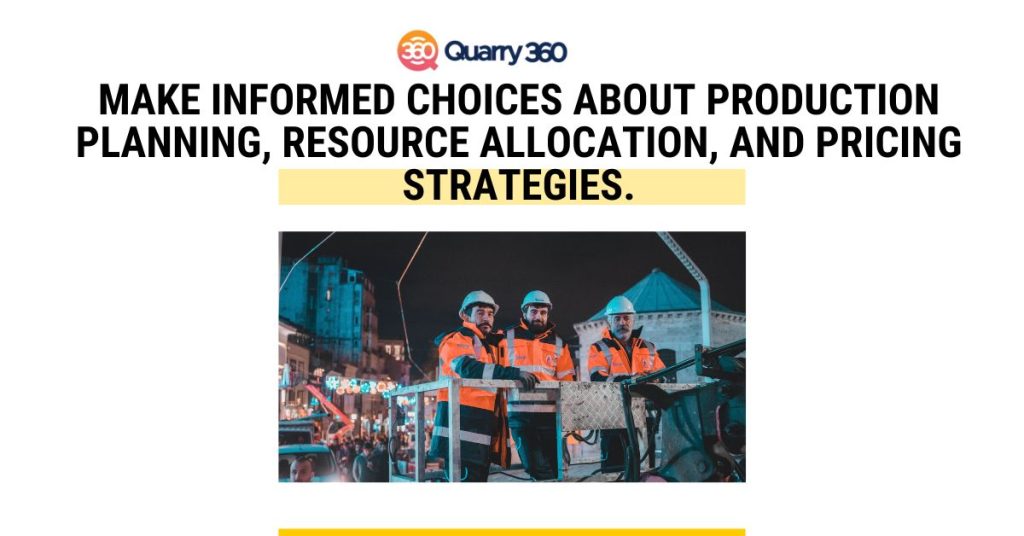In today’s competitive mining industry, maximizing efficiency and profitability is crucial for success. Every ton of material extracted, processed, and delivered needs to be done seamlessly and cost-effectively. This is where Enterprise Resource Planning (ERP) systems and 360-degree analytics come into play.
In today’s competitive mining industry, maximizing efficiency and profitability is crucial for success. Every ton of material extracted, processed, and delivered needs to be done seamlessly and cost-effectively. This is where Enterprise Resource Planning (ERP) systems and 360-degree analytics come into play.

Challenges Faced by Stone Quarrying Businesses
The stone quarrying industry faces a unique set of challenges that can hinder its growth and profitability. Some of the most common ones include:
- Complex Supply Chain Management: Stone quarrying involves a complex web of activities, from extraction and processing to transportation and delivery. Managing this intricate supply chain efficiently can be a significant challenge.
- Inventory Management: Maintaining optimal inventory levels of raw materials, finished products, and spare parts is essential. Overstocking leads to unnecessary costs, while understocking can cause delays in production and fulfillment.
- Equipment Maintenance and Uptime: Quarrying equipment is often expensive and requires regular maintenance to ensure optimal performance and minimize downtime.
- Safety and Compliance: The mining industry has strict safety regulations that need to be adhered to. Additionally, there are environmental compliance requirements that must be met.
- Data Silos and Lack of Visibility: Critical data often resides in disparate systems, making it difficult to get a holistic view of operations and make informed decisions.
How ERP Systems Can Transform Your Stone Quarrying Business
ERP systems are integrated software solutions that streamline and automate core business processes across an organization. By implementing an ERP system specifically designed for 0, you can gain significant advantages in several key areas:
- Improved Supply Chain Visibility: An ERP system provides a centralized platform for managing your entire supply chain. You can track raw material procurement, production processes, inventory levels, and product delivery in real-time. This enhanced visibility allows you to identify bottlenecks, optimize logistics, and ensure timely deliveries.
- Streamlined Inventory Management: ERP systems offer robust inventory management functionalities. You can set reorder points, track stock levels across different locations, and generate reports to identify slow-moving or excess inventory. This helps you maintain optimal stock levels, reduce carrying costs, and avoid stockouts.
- Enhanced Equipment Management: An ERP system can help you track equipment maintenance schedules, identify potential issues before they escalate into breakdowns, and manage spare parts inventory. This proactive approach ensures maximum equipment uptime and minimizes downtime-related costs.
- Improved Safety and Compliance: ERP systems can help you manage safety protocols, track training records, and monitor compliance with environmental regulations. They can also generate reports to identify safety hazards and implement corrective measures.
- Data-Driven Decision Making: ERP systems consolidate data from across your organization, providing you with a unified view of your operations. This wealth of data can be used to generate insightful reports and analytics that empower you to make informed decisions about production planning, resource allocation, and pricing strategies.
0How ERP Systems Can Transform Your Stone Quarrying Business
ERP systems are integrated software solutions that streamline and automate core business processes across an organization. By implementing an ERP system specifically designed for Stone Quarry Management Software, you can gain significant advantages in several key areas:
- Improved Supply Chain Visibility: An ERP system provides a centralized platform for managing your entire supply chain. You can track raw material procurement, production processes, inventory levels, and product delivery in real-time. This enhanced visibility allows you to identify bottlenecks, optimize logistics, and ensure timely deliveries.
- Streamlined Inventory Management: ERP systems offer robust inventory management functionalities. You can set reorder points, track stock levels across different locations, and generate reports to identify slow-moving or excess inventory. This helps you maintain optimal stock levels, reduce carrying costs, and avoid stockouts.
- Enhanced Equipment Management: An ERP system can help you track equipment maintenance schedules, identify potential issues before they escalate into breakdowns, and manage spare parts inventory. This proactive approach ensures maximum equipment uptime and minimizes downtime-related costs.
- Improved Safety and Compliance: ERP systems can help you manage safety protocols, track training records, and monitor compliance with environmental regulations. They can also generate reports to identify safety hazards and implement corrective measures.
- Data-Driven Decision Making: ERP systems consolidate data from across your organization, providing you with a unified view of your operations. This wealth of data can be used to generate insightful reports and analytics that empower you to make informed decisions about production planning, resource allocation, and pricing strategies.
The Power of 360-Degree Analytics in Stone Quarrying
ERP systems provide a solid foundation for data collection and organization. However, to truly unlock the power of your data, you need to leverage 360-degree analytics. This involves integrating data from various sources, including:
- Production data: Machine data, sensor readings, and production output.
- Inventory data: Stock levels, consumption rates, and reorder points.
- Financial data: Costs, revenues, and profitability.
- Sales data: Customer orders, delivery schedules, and sales trends.
- Equipment data: Maintenance records, downtime events, and fuel consumption.
By analyzing this comprehensive data set, you can gain a deeper understanding of your operations and identify areas for improvement. Here are some ways 360-degree analytics can benefit your stone quarrying business:
- Predictive Maintenance: By analyzing equipment data, you can predict potential maintenance issues before they occur. This allows you to schedule preventive maintenance, minimizing downtime and extending the lifespan of your equipment.
- Process Optimization: Analytics can help you identify bottlenecks in your production processes and optimize them for efficiency. You can analyze factors like machine performance, worker productivity, and material flow to streamline operations and maximize output.
- Improved Resource Allocation: By analyzing data on production costs, equipment utilization, and customer demand, you can allocate resources more effectively. This ensures that you are using your equipment and workforce to their full potential.
- Enhanced Customer Service: Customer data can be used to understand customer needs and preferences better. You can use this information to personalize your offerings, improve delivery schedules, and provide exceptional customer service.
Contact Us
Name: Syvasoft Business Solutions Pvt Ltd
Address: 51/4, Bharathi Ula Road, ITI Stop, K.Pudur Madurai – 625002 India
Contact No.: +91 99765 48723
Email Id: sales@syvasoft.com
Visit for more Info: https://quarry360.com/


















































